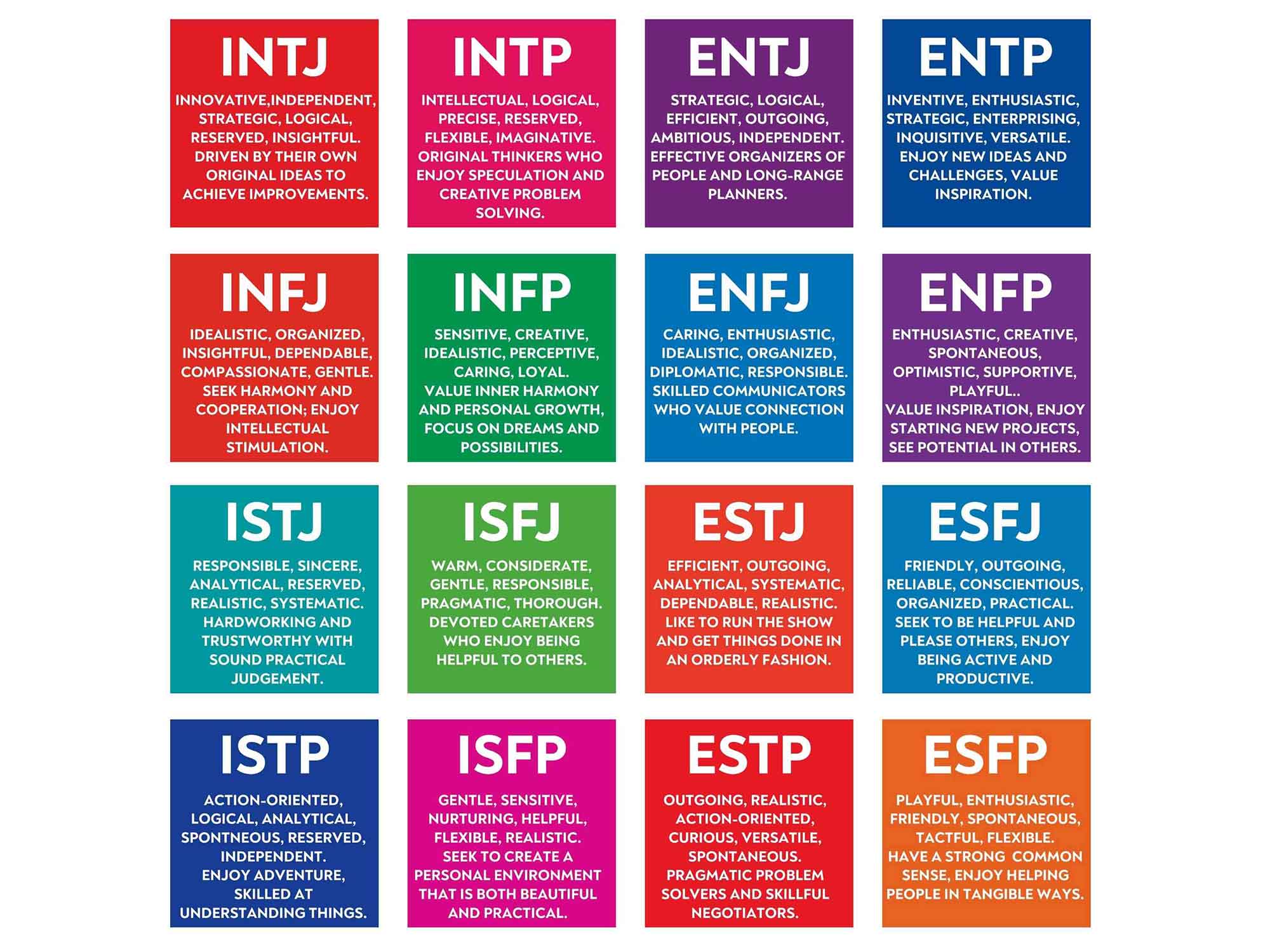What is the Myers Briggs Personality Types Test?
.jpg)
Based on Carl Jung's exploration of personality types, the Myers-Briggs Type Indicator (MBTI) has become a widely recognised personality assessment tool used by professionals and employees alike in the workplace
The Myers-Briggs Type Indicator (MBTI) is a personality assessment tool developed in the 1940s by Isabel Briggs Myers and her mother, Katherine Briggs. This tool categorises personality types based on four dichotomies: extraversion vs. introversion, sensing vs. intuition, thinking vs. feeling, and judging vs. perceiving. When individuals take the test, they receive a four-letter personality type reflecting their preferences within these dichotomies.
While the MBTI has faced criticism for its scientific validity and reliability, many individuals and organisations still find value in it for self-awareness and understanding. Identifying one's personality type can provide insights into strengths, weaknesses, and communication styles, which can be especially beneficial in team environments. Understanding team members' diverse perspectives and approaches can enhance collaboration and boost productivity.
The Myers Briggs personality test is a useful teamwork theory alongside others like Belbin's Team Roles and Maslow's Hierarchy of Needs.
History of Myers Briggs Personality Test
The Myers-Briggs Personality Test has a captivating history that begins with Katherine Briggs and her daughter, Isabel Briggs Myers. Katherine, an author and housewife, developed an interest in personality and psychological types in the early 1920s. Around the same time, Carl Jung's "Psychological Types" was translated into English, sparking Katherine's fascination with his theories, which she felt offered greater depth than her own.
Katherine started writing papers on Jung’s work and soon teamed up with Isabel to develop their own personality type theory. Drawing from Jung and other contemporary psychologists, they created a system aimed at helping individuals understand themselves and others better. The Myers-Briggs Type Indicator (MBTI) was first published in 1962 and quickly gained traction in both business and academic circles.
Today, the MBTI is one of the most widely used personality assessments globally, with millions of people taking the test annually. Despite criticisms regarding its reliability and validity, many individuals and organisations still utilise it for self-awareness and personal insight. It’s fascinating to see how the MBTI evolved from Jung’s foundational work, with Katherine and Isabel expanding upon his theories to create a test that has significantly influenced the field of personality psychology.
What are the Myers Briggs Types?
The Myers-Briggs Theory identifies 16 personality types, each rooted in four categories, with each category split into two contrasting types. To find out which type best fits an individual, participants respond to a series of questions that explore their thoughts, feelings, behaviours, and thought processes. This approach helps clarify where someone falls within the various personality dimensions.

How to Use the Myers Briggs Personality Test
Interested in finding out what your Myers Briggs Personality type is? Follow along and answer the questions put forward in the flashcards listed below!
1. Are you Inward or Outwardly Focused?
If you...
- Described as Talkative, Outgoing
- Like to be in a Fast-Paced Environment
- Working out Ideas Aloud/With Others
- Enjoy being Centre of Attention
then you are...
E - Extroverted
If you...
- Described as Reserved, Private
- Prefer a Slower Pace for Contemplation
- Think things through Internally
- Would rather Observe a Situation
then you are...
I - Introverted
2. How Do you Prefer to take in Information?
If you...
- Focus on the Reality of a Situation
- Pay Attention to Facts & Details
- Prefer Ideas with Practical Application
- Like to Describe things Literally
then you are...
S - Sensing
If you...
- Imagine the Possibilities of Situations
- Notices the Bigger Picture
- Enjoys Ideas for their Own Sake
- Describes things in a Poetic way
then you are...
N - Intuition
3. How Do you Prefer to Make Decisions?
If you...
- Impersonal, Logical Reasoning
- Values Justice and Fairness
- Enjoys finding Flaws in Arguments
- Reasonable and Level-Headed
then you are...
T - Thinking
If you...
- Decisions based on Personal Values
- Values Harmony and Forgiveness
- Like to Please Others & Find the Best
- Described as Warm & Empathetic
then you are...
F - Feeling
4. How Do you Prefer to Live your Life?
If you...
- Prefer to Settle Matters
- Rules & Deadlines to be Respected
- Prefers Detailed, Step-by-Step Tasks
- Likes to Make Plans
then you prefer...
J - Judging
If you...
- Prefer to Leave Options Open
- See Rules & Deadlines as Flexible
- Likes to Improvise, on-the-spot
- Spontaneous, enjoys New Situations
then you are...
P - Perceiving
Criticisms of the Myers-Briggs Test
Despite its widespread use in companies and organisations around the globe, the Myers-Briggs Test has faced several criticisms since its inception. One common point of contention is that the results can be overly simplistic, making it difficult to categorise individuals as strictly extroverted or introverted. Additionally, the accuracy of the results can be questionable, as this self-directed test relies on participants to answer honestly. If individuals exaggerate or provide misleading responses, it can skew the outcomes. Nevertheless, many still find the MBTI a valuable tool for self-improvement and gaining insights into personal development.
Plan your Team Day
We organise 100's of team building events each year
